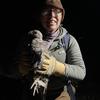Hi everyone!
I'm a new Wildlabs member, and I'm seeking advice on transitioning to a career in conservation tech. I have a BSc in Wildlife Ecology and experience as a field technician, but I want to pivot my career to focus on applying technology, especially AI, to wildlife conservation.
Despite self-studying Python and R, I need more structured learning and am considering returning to school. I'm debating between an additional undergraduate degree in Computer Science or a "bridge" program to an MSCS. I’m currently limited to online programs or Northeastern University, which has a campus in the SF Bay Area. However, I've read mixed reviews on Northeastern's program, and I'm also concerned about the effectiveness of a bridge program in providing a solid foundation compared to another undergraduate degree. Lastly, most online MSCS programs have a capstone project instead of a thesis, which may not carry the same weight as a thesis when applying for a PhD. My reasoning for completing another undergraduate degree is that it would keep my options open for where to pursue a master's, and I should be able to move cities in a few years.
Despite being unable to relocate, now is a good time for me to move toward this goal. I would truly appreciate any advice or guidance you can provide!
7 July 2024 8:26am
Transitioning into conservation tech with a background in wildlife ecology and an interest in AI involves choosing between a bridge program to an MSCS and a second undergraduate degree in Computer Science.
- Bridge Program (to MSCS): Pros include efficiency and flexibility for future program choices, but it may not provide as deep a CS foundation as a full degree.
- Second Undergraduate Degree (in CS): Offers thorough CS knowledge and academic immersion but requires more time and cost.
Considerations:
- Career Goals: Applied roles may benefit from a bridge program, while a second degree could be better for research or PhD aspirations.
- Program Quality: Evaluate reputation, curriculum, faculty, and alumni outcomes.
- Practical Steps: Research programs, consult advisors, and consider online options for flexibility.
Choose based on how well each option aligns with your career goals and preferred learning style.



Agripina Cletus
Frankfurt Zoological Society